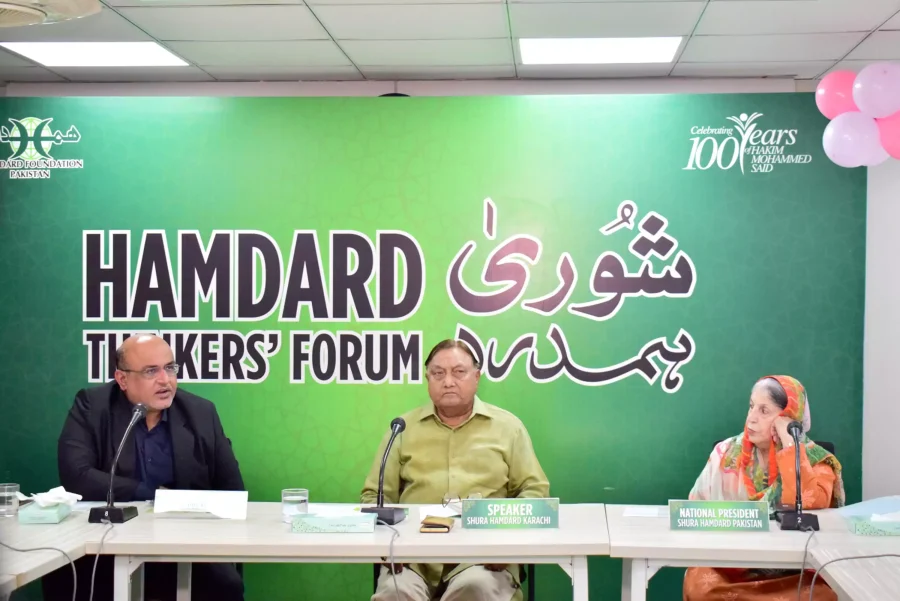Members of the Hamdard Shura Karachi Chapter emphasized that proposing a budget favourable to the people during such economic difficulties is achievable only if measures are taken to reduce luxury and unnecessary imports and strict action against corruption during the meeting of the Hamdard Shura Karachi, titled “The Conditions of IMF and People-friendly Budget: Is it Possible?” held yesterday at the Hamdard Corporate Head Office. Speaker Gen (r) Moinuddin Haider chaired the proceedings, with Ms. Sadia Rashid, President of Hamdard Foundation Pakistan, in attendance.
The guest speaker Faisal Nadeem, Chief Operating Officer of Hamdard Pakistan, said that unfortunately, corruption, political instability, and financial mismanagement have made the country’s economic situation worse. It’s very hard to create a budget that benefits the people during this financial crisis, but it’s not impossible. To do this, the country needs a strong policy to collect revenue in the country. Currently, Pakistan has only four million people who pay direct taxes. The cash economy, which is not officially recorded, is twice as big as the documented economy. Government needs to ensure that wholesale/retail and agriculture sectors pay taxes. In fact, everyone regardless of their respective sector should be brought into the national tax net. He further said that circular debt and state-owned enterprises are causing financial strain on the country.
To ease this, circular debt needs to be reduced and privatization should be expedited. Pakistan is constantly dealing with trade and budget deficits. The economy lacks innovative thinking, entrepreneurship, and creative solutions. It’s important to inspire young people to start online businesses and to train skilled workers to increase remittances. Without increasing the tax-to-GDP ratio, achieving growth and financial stability is unlikely. Meeting the IMF’s conditions can help improve our economy. Pakistan’s economy can be classified as trading with the absence of robust manufacturing sector. It’s crucial to support manufacturing and keep the economy separate from politics. Pakistan’s defense is under serious threat, with India’s defense budget surpassing $65 billion. Pakistan must also maintain its defensive capabilities.The esteemed members Senator Abdul Haseeb, Engr. Anwar-ul-Haq, Zafar Iqbal, Engr. Pervez Sadiq, Justice (r) Zia Pervez, Prof Dr Tanveer Khalid, Dr. Amjad Jafri, Engr. Ibn-ul-Hassan, Cdre (r)Sadeed Anwar Malik, Prof Dr Shaheen Habib, Rizwan Ahmed and Shahla Ahmed articulated that sales tax puts a heavy load on the poor.
Amnesty schemes that allow converting black money into clean money give unfair disadvantage to those who regularly pay taxes. It’s in the country’s best interest to fulfill the IMF’s requirements. The energy crisis is damaging the manufacturing sector. National policies should prioritize the country and its people, especially the poor and middle class, rather than benefiting only the privileged class. Pakistan’s primary issue lies in mismanagement and a lack of clear direction. Implementing Technical Vocational Education can produce highly skilled workers. Today, nations with robust technological foundations are progressing.










